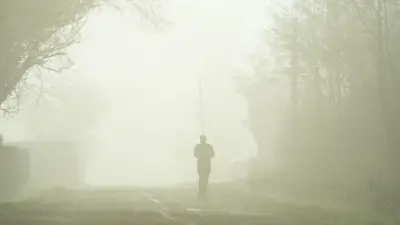We've updated our Privacy and Cookies Policy
We've made some important changes to our Privacy and Cookies Policy and we want you to know what this means for you and your data.
Q&A: Squatting laws
On Saturday, squatting in England and Wales will become a criminal offence. What does that mean?
What is a squatter?
Someone who lives in an empty or abandoned building which they don't own or rent without the owner's permission.
Why do people squat?
The UK has a long history of squatting but there was an explosion in 1960s and 1970s as young people experimented with alternative lifestyles or took part in political protests.
These so-called "lifestyle squatters" are now thought to be far outnumbered by rough sleepers and other vulnerable groups in housing need. According to a recent study by homeless charity Crisis 39% of homeless people have squatted at some time.
Squatting groups say there has been a rise in the practice since the mid-2000s due to a lack of affordable housing, particularly in the South-East of England. Other types of squatter include people who have set up businesses, such as cafes, or community centres, or who want to preserve historic buildings.
How widespread is squatting?
The government estimates there are 20,000 squatters in the UK but squatting groups say the real total is far higher.
Squash, Squatters' Action for Secure 91»»Ī¨s, points out that the number of people on local authority housing lists has nearly doubled since 1997 to five million and there are an estimated 650,000 empty properties in the UK.
What rights do squatters currently have?
Since 1977, it has been illegal to threaten or use violence to enter a property where someone is present and opposes the entry.
The law was introduced to stop landlords from using violence to evict tenants. It is what is commonly meant when people talk about "squatter's rights".
What rights do property owners currently have?
Squatting is currently treated as a civil matter and homeowners - including councils and housing associations - have to go to a civil court to prove the squatters have trespassed before they can be evicted. This process can take by time consuming and costly for property owners.
However, people who have been made homeless by squatters can legally force entry to the property and demand the trespassers leave. If they refuse, the offence can be reported to the police.
Police can also take action if other offences, such as breaking doors or windows to gain entry or stealing electricity, have taken place.
So what is different under the new law?
The main difference is that it will speed up the removal of squatters from unoccupied residential properties, such as vacant council houses, second homes or properties for sale.
For the first time, police will be able to raid a building on suspicion it is being occupied by squatters and remove them.
According to Ministry of Justice , "The new offence will make it more difficult for trespassers to assert they have rights in respect of residential buildings because their occupation of the building will be a criminal act".
It tells officers not be deterred if they see a "squatter's rights" notice on the door as "the police have lawful authority under section 17 of PACE (the Police and Criminal Evidence Act) to enter the property to make an arrest".
What about non-residential buildings?
Squatters occupying non-residential buildings will still be able to claim "squatter's rights".
What penalties do residential squatters face?
The offence of squatting in a residential building carries a maximum penalty of six months' imprisonment, a fine of up to £5,000 or both.
What about squatters who are homeless?
Police are advised to work with local authorities, who have a legal duty to help the homeless find accommodation, before raiding a squat "to ensure they are ready to assist if required and give appropriate advice on housing options".
Will tenants who fall behind with their rent be classed as squatters?
No. Police must prove that a person knowingly entered a building as a trespasser and "is living or intends to live" in it.
Someone who falls behind with their rent or remains in a property at the end of a lease or tenancy would not be committing an offence under the new law.
What is the law in Scotland?
Squatting has been illegal in Scotland since the mid-19th Century. The owner of a property has the right to eject squatters without serving notice or applying to a court for an eviction order.
Top Stories
More to explore
Most read
Content is not available








